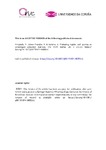Evaluating regular path queries on compressed adjacency matrices

Use this link to cite
http://hdl.handle.net/2183/40774Collections
- Investigación (FIC) [1684]
Metadata
Show full item recordTitle
Evaluating regular path queries on compressed adjacency matricesDate
2025Citation
Arroyuelo, D., Gómez-Brandón, A. & Navarro, G. Evaluating regular path queries on compressed adjacency matrices. The VLDB Journal 34, 2 (2025). https://doi.org/10.1007/s00778-024-00885-6
Abstract
[Abstract]: Regular Path Queries (RPQs), which are essentially regular expressions to be matched against the labels of paths in labeled graphs, are at the core of graph database query languages like SPARQL and GQL. A way to solve RPQs is to translate them into a sequence of operations on the adjacency matrices of each label. We design and implement a Boolean algebra on sparse matrix representations and, as an application, use them to handle RPQs. Our baseline representation uses the same space and time as the previously most compact index for RPQs, outperforming it on the hardest types of queries—those where both RPQ endpoints are unspecified. Our more succinct structure, based on -trees, is 4 times smaller than any existing representation that handles RPQs. While slower, it still solves complex RPQs in a few seconds and slightly outperforms the smallest previous structure on the hardest RPQs. Our new sparse-matrix-based solutions dominate a good portion of the space/time tradeoff map, being outperformed only by representations that use much more space. They also implement an algebra of Boolean matrices that is of independent interest beyond solving RPQs.
Keywords
Regular path queries on graph databases
Compact data structures for adjacency matrices
Sparse matrices
Sparse Boolean matrices
Compact data structures for adjacency matrices
Sparse matrices
Sparse Boolean matrices
Description
O software está dispoñible en: https://github.com/adriangbrandon/rpq-matrix Dataset relacionado: https://zenodo.org/records/7254968 This version of the article has been accepted for publication, after peer review and is subject to Springer Nature’s AM terms of use, but is not the Version of Record and does not reflect post-acceptance improvements, or any corrections. The Version of Record is available online at: https://doi.org/10.1007/s00778-024-00885-6
Editor version
Rights
Copyright © 2024, The Author(s), under exclusive licence to Springer-Verlag GmbH Germany, part of Springer Nature
ISSN
1066-8888





